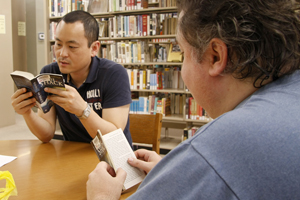Public Libraries
The most accessible learning opportunities in Lincoln are found in the eight public libraries sprinkled throughout the city.

Public libraries are open to anyone, and provide access to books, magazines, newspapers and the internet. Some libraries also have video and music selections. Anyone can access these materials on the premises, but one must have a library card if they wish to borrow or “check out” an item to take home. Items can be checked out from the library for three weeks before incurring late fees.
Getting a library card is simple and free to anyone living in Lincoln and Lancaster County. To receive a library card one must prove their identity with an official document such as a driver’s license or passport, and prove residence in the county. Proof of residence could be a driver’s license, utility bill, or any piece of mail post-marked within the last 30 days.
Lincoln Libraries occasionally offer special services like computer and internet training courses, or even help with income taxes.
Public Schools
The Lincoln Public Schools system is government-run agency funded by property taxes and other public resources.
All Nebraska children between 6- and 18-years-old are required to attend school, although some students may quit school at 16 with parental permission. Students must finish high school before turning 22-years-old or they will...READ MORE
College
College or post-secondary education has become more and more important in the United States over the years. Most good paying, professional jobs require a four-year college degree before anyone can even apply for an entry-level job.
Although college can be expensive, there are several ways to fund the education with...READ MORE
Private Schools
There are 22 private schools for elementary and high school students. While public schools are free, private schools in Lincoln are typically run by religious organizations and require tuition payments from students or their families.
Although all private schools in Lincoln are Christian-based, Christian beliefs are not required to enroll. For example, there are eleven Catholic elementary schools and nine Lutheran schools in Lincoln, but anyone, regardless of race or religion, may enroll. However, tuition rates may be cheaper for those of Catholic or Lutheran faith.
Museums
There are often educational opportunities at museums or important cultural landmarks such as the State Capitol building.
The State Capital offers every hour free tours of the building that explain the archtechure, the culture and history of Nebraska, its people and its government.
Much more can be learned about Nebraskan and American history in the many musems in the city.
